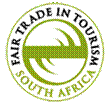Knowledge Networking Portal for Sustainable & Responsible Tourism










 Jennifer Seif of FTTSA: Tour operators - pay fair prices and be transparent
Jennifer Seif of FTTSA: Tour operators - pay fair prices and be transparent
Focus on sustainable tourism certifying
 |
Find out more about the Fair Trade in Tourism South Africa certificate and see all their certified tourism businesses |
 |
Jennifer Seif of Fair Trade Tourism South Africa talks to Valere Tjolle of Vision on Sustainable Tourism: Tour operators - pay fair prices and be transparent
Valere Tjolle: Can you give me a brief outline of the FTTSA current work?
Jennifer Seif: Fair Trade in Tourism South Africa (FTTSA) is scaling up its programme of work, reaching out to Africa to grow supply of Fair Trade Tourism products while also stimulating demand in Europe and other key source markets. This work is funded primarily by the Swiss State Secretariat of Economic Affairs (SECO) over a four year period. Fair Trade Tourism is based on a product standard that certifies sustainability at "firm" level, plus a trade standard that certifies fair commercial relationships in tourism value chains. Combined, these standards result in Fair Trade holidays to Africa.
There are currently 14 holidays for sale in Europe. Over the next four years we will grow demand by bringing products from eight countries into the system (Botswana, Lesotho, Madagascar, Mozambique, Namibia, South Africa, Swaziland and Tanzania) and encouraging tour operators to develop and market holidays to the region. We hope that the model developed in the South will provide the basis for a future international Fairtrade mark for tourism, which will provide an effective means of bringing sustainable products to market. High volumes of consumers in Europe as well as North America know and trust the Fairtrade mark and expanding its scope to tourism will enable us to talk to travelers about sustainability in a language they understand and are loyal to.
VT: Which roles have climate change, halting the loss of biodiversity, supporting regional economy, travel slow, consume less, in your certification standards?
JS: The Fair Trade Tourism Standard is aligned to the Global Sustainable Tourism Criteria and was one of the first globally to achieve GSTC recognition. The Fair Trade Tourism standard assures business commitment to sustainable production, biodiversity conservation, fair labour standards, local economic development and human rights. Additionally, Fair Trade Tourism highhlights the importance of sustainable trade in tourism, predicated on the principle that CSR and similar initiatives in the North must be accompanied by fair prices, equitable risk sharing and minimizing economic leakage from destinations and from economically poor communities within them.
VT: Which e.g. 3-5 exemplary FTTSA businesses would you highlight to give our readers an idea of your accredited establishments in Europe?
JS: The Fair Trade Tourism product portfolio is extremely diverse, counting established as well as community based enterprises and targeting accommodation as well as activities, voluntourism programmes and packaged travel. There are Fair Trade Tourism places to stay and things to do for everyone from backpackers to families to luxury travelers. Check out:
- Spier wine estate in Stellenbosch near Cape Town - a business committed to triple bottom line sustainability that has a huge positive impact on workers, communities, society and the environment.
- Calabash city and shebeen tours in Port Elizabeth - responsible township tours that leave meaningful and lasting benefits in historically marginalized communities.
- Bulungula Lodge on South Africa's iconic Wild Coast - 40% owned by a rural community and delivering authentic cultural experiences to guests
- Soweto Hotel - an urban chic experience in South Africa's most famous township, providing a gateway for cultural and business tourism in Johannesburg
- Motswari Private Game Reserve in the Timbavati (greater Kruger) - safaris that make a difference to staff and rural communities.
VT. What added value do you think that GSTC will give you?
JS: FTTSA's plans to scale up supply and demand are predicated on working collaboratively with sister certification programmes. GSTC recognition, approval and accreditation will help to facilitate this by providing third party endorsement of standards and labels.
Market access initiatives by the GSTC require higher volumes of certified products. Until we collectively address supply side gaps, certification won't have the desired impacts. This is a common problem that all certifies should work to address collectively
VT. What is your opinion of Rio+20?
JS: Inclusion of tourism in the final outcome document was a significant achievement. Going forward, sustainable tourism will be framed within broader debates about sustainable consumption and production. The days of tourism being a "special" case for development are over. Tourism must embrace and in many instances catch up with debates taking place in other sectors, inclusive of sustainable trade, decent work and human rights.
VT: If you had 2 wishes
1 What should tour operators and travel agencies be committed to as a common rule?
JS: First and foremost: Paying fair prices and being transparent about pricing to customers. In addition, using products with reputable sustainability credentials and communicating this practice to customers. Sustainable is not automatically more expensive and the travel trade needs to help destinations communicate this reality to consumers.
2 What would you like the powers that are ie South Africa/African countries/UN/World governments to do that would foster the growth of organisations like FTTSA?
JS: Create incentives for businesses to operate more sustainably. Not simply subsidies for certification, which ultimately distort the market, but preferential access to training, showcasing by national tourism boards, access to public supply chains and investment mechanisms.
Find out more about the Fair Trade in Tourism South Africa certificate and see all their certified tourism businesses HERE
Tuesday, October 16, 2012
|
|
|
| Address | |
|---|---|
| Keywords | Certification, |
| Target group(s) | Businesses , Travellers |
| Topics | Certification & Marketing |














































